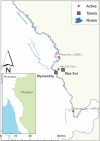'Because the baby asks for it': a mixed-methods study on local perceptions toward nutrition during pregnancy among marginalised migrant women along the Myanmar-Thailand border
- PMID: 29785874
- PMCID: PMC5965027
- DOI: 10.1080/16549716.2018.1473104
'Because the baby asks for it': a mixed-methods study on local perceptions toward nutrition during pregnancy among marginalised migrant women along the Myanmar-Thailand border
Abstract
Background: Under- and over-nutrition during pregnancy are known risk factors for pregnancy complications and adverse pregnancy and infant outcomes. Understanding perceptions around nutrition in pregnancy can create culturally appropriate interventions for improved health outcomes.
Objective: A mixed-methods study was performed to explore local perceptions and practices of diet and physical activity in pregnancy in a marginalised population along the Myanmar-Thailand border.
Methods: From April to July 2017, a cross-sectional survey and focus group discussions were conducted with pregnant women reporting to antenatal care; in-depth interviews were conducted with senior midwives at participating organisations along the Myanmar-Thailand border.
Results: A total of 388 pregnant women were interviewed at two clinic sites along the Myanmar-Thailand border. A high proportion of women had limited knowledge of and poor dietary practices. Consuming a sweetened drink in the last 24 hours as well as being a non-teenage, multigravida woman was significantly associated with high body mass index (BMI) compared to normal BMI. Qualitative analysis combined focus group discussions (n = 66) and in-depth interviews (n = 4) summarising emergent themes: common foods eaten or avoided and rationale; benefits of nutrition; perceptions of overweight and weight gain during pregnancy; barriers to a healthy diet; and sources of diet information.
Conclusions: There is limited awareness about healthy diets and lifestyle in these marginalised, migrant communities along the Myanmar-Thailand border. This study suggests that simple, culturally appropriate messaging should be provided to women and communities with low health literacy to generate awareness about healthy lifestyles and their effects on pregnancy outcomes as an important element of a broader strategy to address maternal nutrition in this population. However, more studies to determine the effectiveness of a broad range of interventions in low- and middle-income countries (LMIC) are needed, especially in marginalised migrant populations.
Keywords: Nutrition in pregnancy; dietary preferences; eating behaviours; nutrition awareness.
Figures
Similar articles
-
Nutrition in transition: historical cohort analysis summarising trends in under- and over-nutrition among pregnant women in a marginalised population along the Thailand-Myanmar border from 1986 to 2016.Br J Nutr. 2019 Jun;121(12):1413-1423. doi: 10.1017/S0007114519000758. Epub 2019 Apr 22. Br J Nutr. 2019. PMID: 31006391
-
Myanmar immigrant women's perceptions, beliefs, and information-seeking behaviors with nutrition and food practices during pregnancy in Thailand: a qualitative study.Int J Equity Health. 2024 Aug 7;23(1):156. doi: 10.1186/s12939-024-02240-1. Int J Equity Health. 2024. PMID: 39113036 Free PMC article.
-
Giving birth on the way to the clinic: undocumented migrant women's perceptions and experiences of maternal healthcare accessibility along the Thailand-Myanmar border.Reprod Health. 2023 Dec 6;20(1):178. doi: 10.1186/s12978-023-01722-9. Reprod Health. 2023. PMID: 38057915 Free PMC article.
-
Adolescents' perceptions and experiences of pregnancy in refugee and migrant communities on the Thailand-Myanmar border: a qualitative study.Reprod Health. 2018 May 22;15(1):83. doi: 10.1186/s12978-018-0522-7. Reprod Health. 2018. PMID: 29789019 Free PMC article.
-
Cultural food practices and sources of nutrition information among pregnant and postpartum migrant women from low- and middle-income countries residing in high income countries: A systematic review.PLoS One. 2024 May 9;19(5):e0303185. doi: 10.1371/journal.pone.0303185. eCollection 2024. PLoS One. 2024. PMID: 38723007 Free PMC article.
Cited by
-
Infantile thiamine deficiency in South and Southeast Asia: An age-old problem needing new solutions.Nutr Bull. 2021 Mar;46(1):12-25. doi: 10.1111/nbu.12481. Epub 2021 Jan 11. Nutr Bull. 2021. PMID: 33776582 Free PMC article. Review.
-
"I can't read and don't understand": Health literacy and health messaging about folic acid for neural tube defect prevention in a migrant population on the Myanmar-Thailand border.PLoS One. 2019 Jun 13;14(6):e0218138. doi: 10.1371/journal.pone.0218138. eCollection 2019. PLoS One. 2019. PMID: 31194796 Free PMC article.
-
Anemia and Nutritional Status of Syrian Refugee Mothers and Their Children under Five Years in Greater Beirut, Lebanon.Int J Environ Res Public Health. 2021 Jun 27;18(13):6894. doi: 10.3390/ijerph18136894. Int J Environ Res Public Health. 2021. PMID: 34199032 Free PMC article.
-
Determinants of changes in women's and men's eating behavior across the transition to parenthood: a focus group study.Int J Behav Nutr Phys Act. 2021 Jul 12;18(1):95. doi: 10.1186/s12966-021-01137-4. Int J Behav Nutr Phys Act. 2021. PMID: 34253197 Free PMC article.
-
Traditional prenatal and postpartum food restrictions among women in northern Lao PDR.Matern Child Nutr. 2022 Jan;18(1):e13273. doi: 10.1111/mcn.13273. Epub 2021 Sep 30. Matern Child Nutr. 2022. PMID: 34595830 Free PMC article.
References
-
- Aune D, Saugstad OD, Henriksen T, et al. Maternal body mass index and the risk of fetal death, stillbirth, and infant death: a systematic review and meta-analysis. JAMA. 2014. April 16;311:1536–12. - PubMed
-
- Black RE, Victora CG, Walker SP, et al. Maternal and child undernutrition and overweight in low-income and middle-income countries. Lancet. 2013;382:427–451. - PubMed
-
- Kiel DW, Dodson EA, Artal R, et al. Gestational weight gain and pregnancy outcomes in obese women: how much is enough? Obstet Gynecol. 2007;110:752–758. - PubMed
-
- Nohr EA, Vaeth M, Baker JL, et al. Pregnancy outcomes related to gestational weight gain in women defined by their body mass index, parity, height, and smoking status. Am J Clin Nutr. 2009;90:1288–1294. - PubMed
-
- Adair LS. Long-term consequences of nutrition and growth in early childhood and possible preventive interventions. International nutrition: achieving millennium goals and beyond. Vol. 78 Basel: Kargers Publishers; 2014. p. 111–120. - PubMed
Publication types
MeSH terms
Grants and funding
LinkOut - more resources
Full Text Sources
Other Literature Sources
Miscellaneous


